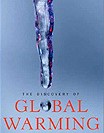The Discovery of Global Warming, the book, is a compact 200-page summary of what I learned from my research for this Website, woven into a single narrative. It begins as a sort of detective story, describing how a few scientists got obsessed with the mysteries of climate change. By the end it has become an epic tale where entire governments, national publics, and communities of scientists press upon one another.
What do reviewers say about the book?
"...provides a balanced historical overview of the science of climate change, clearly earning a place as a key work for anyone interested in the topic... The story presented is easy and enjoyable to read; Weart puts a human face on the science without descending into journalistic cliché."(1)
"...In some places the book does indeed read almost like an elaborate mystery story, with all the attendant false clues and twists of plot.... Weart's approach... gives just the kind of treatment that places the history of ideas in the context they demand."(2)
"Weart's style is fluid, his narrative is anecdotal yet informative, and his coverage is succint yet comprehensive... while The Discovery of Global Warming is written at a popular level, it is certain to become one of the few items of required reading for scholars and researchers in the field."(3)
Okay, but that's only the favorable reviews, right?
Actually, those quotes are extracted from the least favorable reviews. I'll say a few words about these reviewers' criticisms below. Other reviewers have been more favorable. USA Today says "This short, well-written book... adds a serious voice to the overheated debate about global warming and would serve as a great starting point for anyone who wants to better understand the issue."(4) The reviewer for Nature calls The Discovery of Global Warming "a terrific book... balanced historically, beautifully written and, not least important, short and to the point."(5) The average reviewer for Amazon.com gives the book the top rating of five stars: "Great balanced survey of the history of climate science;" "Recommended to anyone with any interest in the issue;" "Beautifully written, clear discussion of science and history," etc. USA Today and Discovery magazine listed it as one of the top science books of the year, and Scientific American made it an "Editors Recommend" selection.(6) Other review excerpts here.
| You can order the book from Harvard University Press or Amazon.com. About the author.
|

|
Now about those criticisms...?
Many reviewers complained that I left out important features of the history. One point that several reviewers mentioned, and which I must concede, is that neither the book nor the Website says enough about European developments of recent decades. Western European politicians and publics have shown great sensitivity to the problem of climate change, and there is much to learn from them. A few European scientists also felt I should have said more about European scientists, and they're probably right. Otherwise, no two reviewers agreed on just which features of the history had been missed. Most of the information they want is available somewhere on this Website, but I simply didn't have room for everything in a book that is meant to be a quick read.
A few reviewers faulted me for not giving greater attention to the arguments of certain scientists who deny that we have a problem with climate change. These reviewers were themselves skeptics, using their reviews to argue against the Intergovernmental Panel on Climate Change consensus. As I warned in the book and in my remarks here, nobody can be fully objective about current scientific work (not the reviewers, and not me). The skeptical scientists' arguments are mentioned in the book and discussed in the appropriate places on this Website. Time will tell whether I should have devoted pages of the book to these particular arguments, at the expense of cutting out pages describing other research that most scientists consider more important and reliable.
1. Maureen Christie, American Scientist
(March-April 2004).
2. Robert Ehrlich, Natural History (April
2004).
3. Ahilleas Maurellis, Physics World (May
2004).
4. Dan Veragno, USA Today (Dec. 11, 2003).
5. Stephen Schneider, Nature (January 15,
2004).
6.USA Today (Dec. ?? 2003); Discovery
(Jan. 2004); Scientific American (Nov. 2003).
Copyright © 2004 Spencer Weart and the American Institute of Physics.
Book cover photo by Frank Cezus © Getty Images